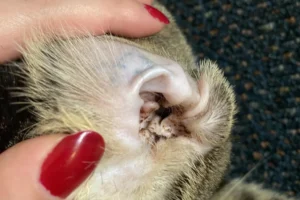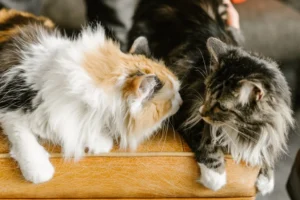Cats are known for their quirky behavior and unique habits, including a peculiar attraction to ear wax. Have you ever wondered why cats seem to be drawn to this sticky substance? Let’s uncover the mystery behind why cats are attracted to ear wax.
The Science Behind Cats’ Sense of Smell
Cats have an incredible sense of smell, with an estimated 200 million odor-sensitive cells in their noses, compared to a human’s 5 million. This heightened olfactory ability allows them to detect scents we can’t even imagine. When it comes to why cats are attracted to ear wax, it may be linked to the various scent compounds present in it that pique their curiosity.
One theory is that ear wax contains fatty acids and proteins that produce a distinct smell appealing to cats. Since cats rely heavily on their sense of smell to explore the world around them, they may be naturally drawn to unique scents like ear wax. This could explain why your feline friend shows interest in this seemingly odd substance.
Additionally, cats have a Jacobson’s organ, also known as the vomeronasal organ, located in the roof of their mouths. This organ allows them to detect pheromones and other chemical signals in a way that humans cannot. When a cat sniffs ear wax, it’s possible that they are utilizing this organ to further analyze the scent and gather information about their environment.
Natural Grooming Instincts of Cats
Cats are meticulous groomers, spending a significant amount of time each day cleaning themselves. This grooming behavior is not just about maintaining their fur; it’s also a way for them to mark their territory and bond with their owners. When it comes to ear wax, cats may view it as a form of self-grooming due to its sticky texture and unique smell.
By sniffing or licking ear wax, cats could be engaging in a grooming ritual that helps them feel calm and secure. They may also be attracted to the natural oils present in ear wax, which could mimic the scent of their own grooming activities. This behavior is perfectly normal for cats and is a reflection of their instinctual need to groom and care for themselves.
In addition to grooming, cats have scent glands located in various parts of their bodies, including their ears. These glands secrete pheromones that communicate a cat’s mood and territory boundaries. When a cat shows interest in ear wax, it could be a way for them to investigate and mark their scent on a familiar object, further reinforcing their sense of security and belonging.
Remember, if your cat is excessively licking or ingesting ear wax, it’s essential to monitor their behavior and consult with a veterinarian to ensure they are not consuming anything harmful.
Nutritional Benefits of Ear Wax for Cats
Believe it or not, cats may be attracted to ear wax because it contains certain nutrients that are appealing to them. Ear wax can be rich in fatty acids, which are essential for a healthy coat and skin. Additionally, ear wax may contain trace amounts of proteins and minerals that could be beneficial for your feline friend. So, if you catch your cat indulging in a little ear wax snack, they might just be trying to get some extra nutrients in their diet!
Stress Relief Through Ear Wax Consumption
Cats are known for their grooming habits, and this includes cleaning their ears. When cats groom themselves, they release endorphins that help them feel relaxed and content. Consuming ear wax during grooming could be a form of self-soothing for cats, similar to how humans might bite their nails or twirl their hair when feeling stressed. So, if you notice your cat nibbling on ear wax, it might be their way of finding comfort and relieving tension.
Additional Unique Insight:
Did you know that some cats may also be attracted to the smell of ear wax due to the pheromones it contains? Pheromones are chemical signals that animals use to communicate, and the scent of ear wax could be comforting to cats, further enhancing their attraction to it.
Potential Health Risks of Cats Eating Ear Wax
Cats may be drawn to ear wax due to its strong smell and taste, but allowing them to consume it can pose potential health risks. When cats ingest ear wax, bacteria from the ear canal can be introduced into their digestive system, leading to stomach upset or even infections. Moreover, the ear wax itself can cause irritation to their delicate stomach lining, resulting in discomfort and digestive issues. It is crucial to discourage this behavior to safeguard your furry friend’s well-being.
Ways to Deter Cats from Ear Wax
Clean Ears Regularly : Keeping your cat’s ears clean and free from excess wax can help reduce the temptation for them to indulge in it.
Provide Alternative Distractions : Offer plenty of interactive toys or treats to redirect your cat’s attention away from ear wax.
Use Deterrents : Sprays or products with bitter tastes, specifically designed to discourage pets from chewing or licking, can be applied to your ears or the areas where your cat tends to show interest.
Consult a Veterinarian : If your cat’s attraction to ear wax persists, seek advice from a vet to rule out any underlying health issues causing this behavior.
Store Ear Cleaning Products Securely : Ensure all ear cleaning solutions and tools are stored out of your cat’s reach to prevent accidental ingestion.
Preventing cats from consuming ear wax is essential for their overall health and happiness. By implementing these strategies, you can effectively discourage this behavior and protect your furry companion from potential health risks.
Other Strange Behaviors in Cats
Cats are known for their quirky behaviors, and being attracted to ear wax is just one of them. But why do these furry creatures have such an interest in ear wax? Well, it turns out that ear wax contains fatty acids and other compounds that cats find appealing. This unique scent is like a siren song to our feline friends, drawing them in for a closer investigation. So, next time your cat tries to sneak a lick of your ear, just know that they can’t resist the alluring aroma of ear wax.
Furthermore, cats have a natural instinct to groom themselves and their loved ones, which may also explain their fascination with ear wax. They see it as a form of bonding and care, similar to how they would groom their fellow feline companions. So, while it may seem strange to us, for cats, it’s just another way of showing affection and providing comfort.
In addition to ear wax, cats exhibit a variety of other peculiar behaviors, such as kneading, purring, and even bringing you “gifts” like dead mice. These behaviors all stem from their instincts and unique personalities, making them the fascinating creatures that we love and adore.
Tips for Promoting Healthy Habits in Cats
Regular Grooming: Help your cat maintain good hygiene by grooming them regularly. This not only keeps their coat healthy but also strengthens your bond with them.
Proper Nutrition: Provide your cat with a balanced diet that meets their nutritional needs. Consult with your veterinarian to determine the best food for your furry friend.
Playtime: Engage your cat in playtime to keep them mentally and physically stimulated. Interactive toys and games can help prevent boredom and encourage healthy behaviors.
Regular Vet Visits: Schedule routine check-ups with your veterinarian to ensure your cat’s overall health and well-being. Early detection of any issues can lead to better outcomes for your feline companion.
Hydration: Make sure your cat has access to fresh, clean water at all times to promote proper hydration. Some cats prefer running water, so consider investing in a cat fountain to encourage drinking.
By incorporating these tips into your cat’s care routine, you can promote positive behaviors and help them lead a happy and healthy life. Remember, a little love and attention go a long way in keeping your feline friend feeling their best.
Fun Facts About Cats and Their Senses
Cats have incredible senses that allow them to navigate the world around them in unique ways. One fascinating aspect of their sensory abilities is their attraction to ear wax. While it may seem strange to us, cats are drawn to ear wax because it contains fatty acids and oils that cats find appealing. These substances mimic the scent of pheromones, creating a natural attraction for cats.
Another interesting fact is that cats have a heightened sense of smell compared to humans, allowing them to detect even the faintest odors. This keen sense of smell plays a significant role in their attraction to ear wax, as they can pick up on the subtle scents emitted from the ear canal.
Additionally, cats have specialized taste buds that are sensitive to certain flavors, further contributing to their interest in ear wax. The combination of these factors results in cats being naturally drawn to this unusual delicacy.
So, the next time you catch your feline friend trying to sneak a taste of your ear wax, remember that it’s simply their unique way of exploring the world through their enhanced senses.
Additional Unique Insight:
Cats grooming each other is a common behavior, known as allogrooming. During this grooming process, cats may also clean each other’s ears, inadvertently exposing them to ear wax. This interaction can further reinforce their attraction to ear wax due to the familiar scent that it carries.
Remember, cats are curious creatures with a keen sense of smell and taste, which can lead to some quirky behaviors like being attracted to ear wax.
Alex, a passionate animal lover, has experience in training and understanding animal behavior. As a proud pet parent to two dogs and three cats, he founded AnimalReport.net to share insights from animal experts and expand his knowledge of the animal kingdom.









